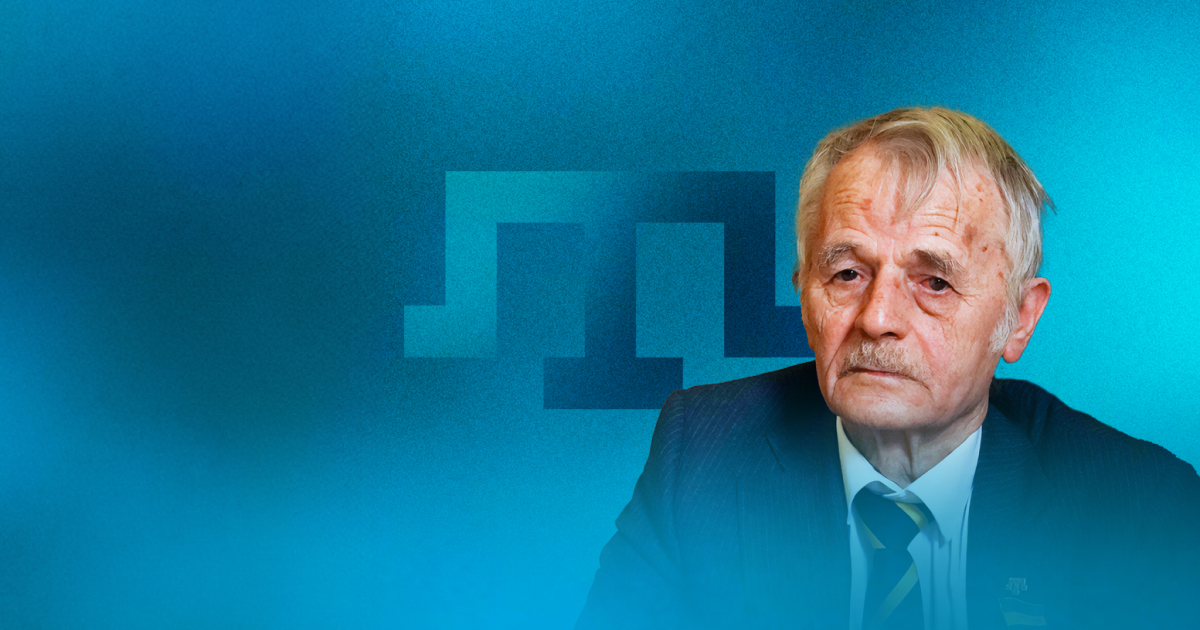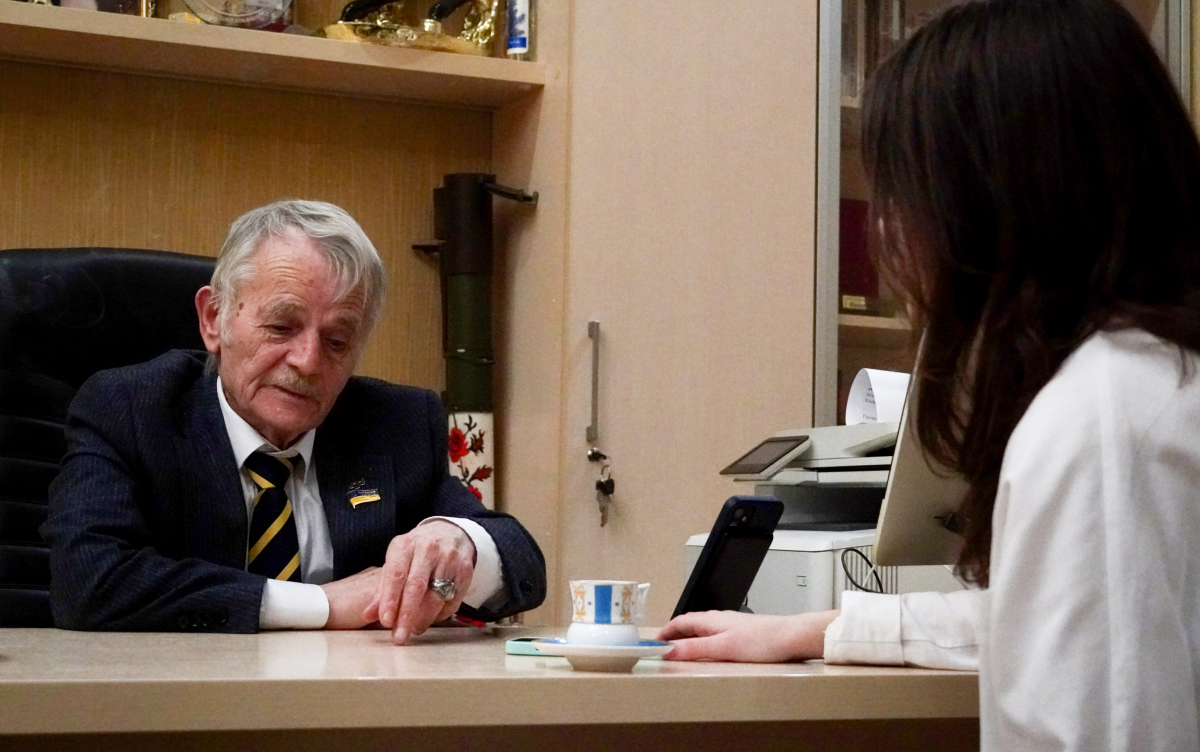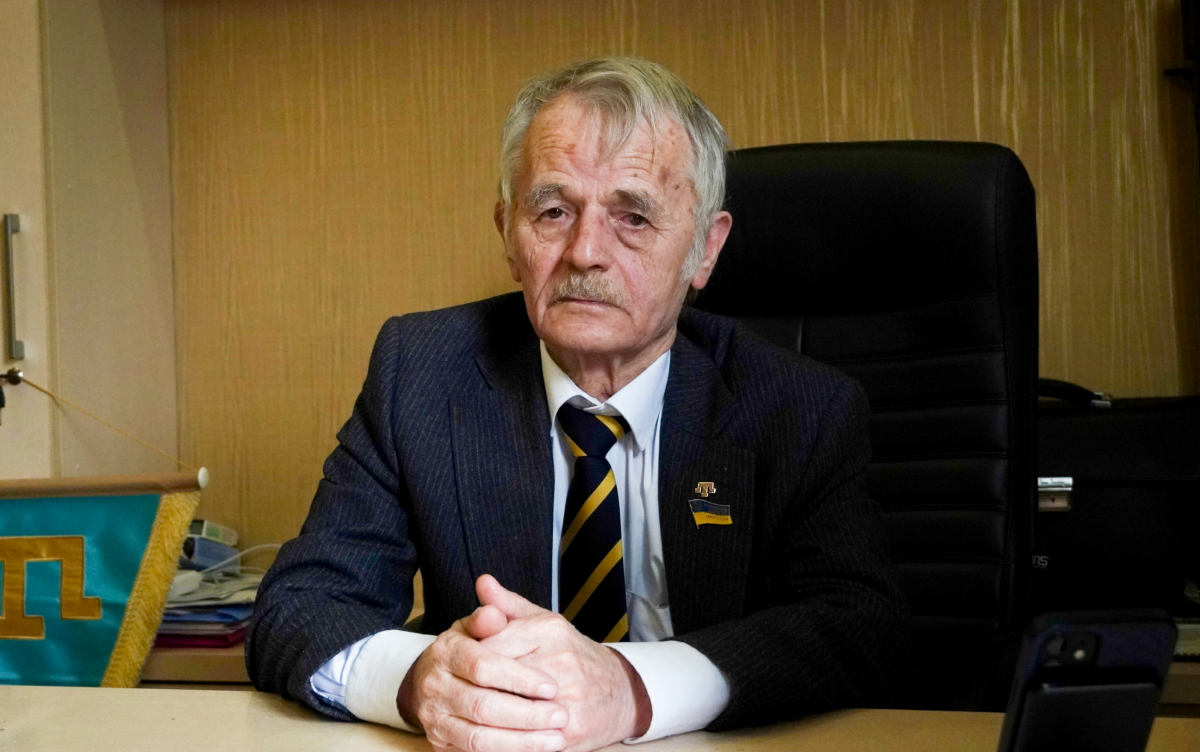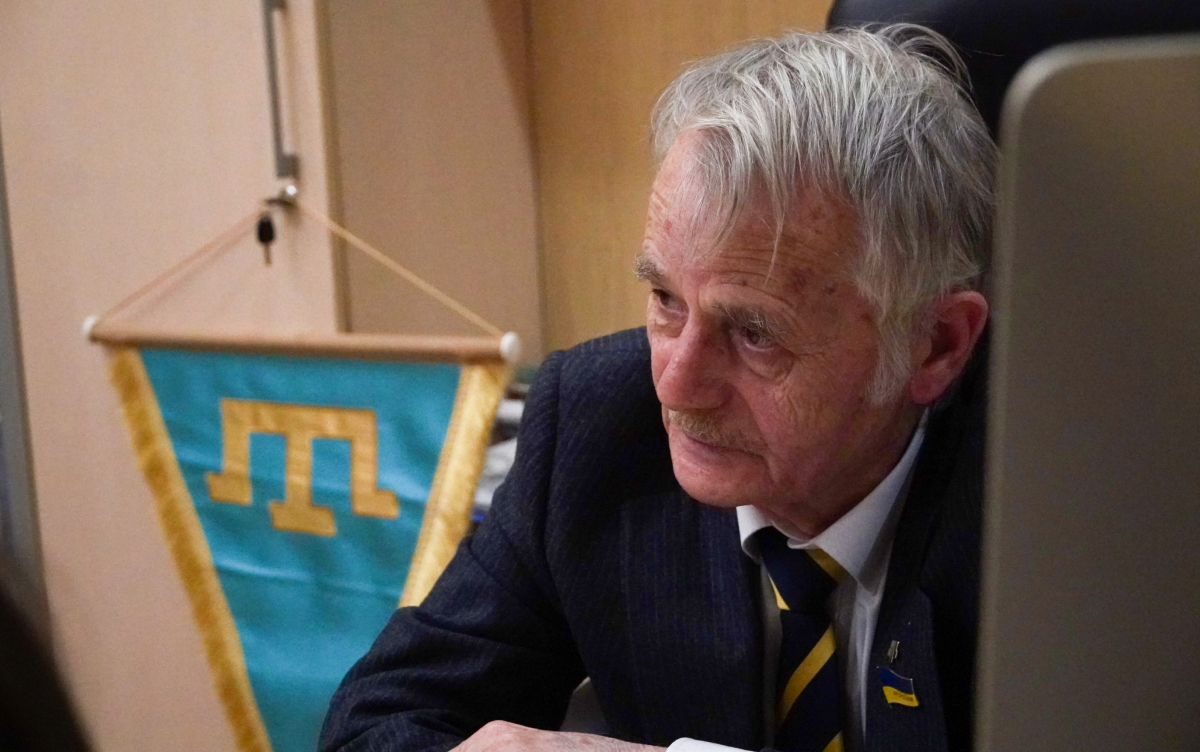«The Soviet authorities were democratic, compared to the occupation regime of Russia,» — Mustafa Cemilev

Mustafa Cemilev is the leader of the Qırımtatarlar, the first head of the Mejlis (the representative body of the Crimean Tatars), and a member of the Ukrainian Parliament. The Soviet authorities imprisoned him for 15 years for «spreading views that despise the Soviet system.»
Throughout his life, Cemilev has been fighting for the rights of Crimean Tatars, first with the Soviet regime and now with the Russian authorities.
Svidomi talked to Mustafa Cemilev about the deportation of Crimean Tatars in 1944, the national movement restoration in Crimea after their return, and the challenges Ukraine will face after de-occupying the temporarily occupied Crimea.
— Do you remember the deportation from Crimea in 1944 and what it was like for your family? When did you manage to return to the peninsula for the first time?
— I was only a few months old then, so I don't remember how it happened. But the deportation procedure for all Crimean Tatar families was roughly the same. A knock on the door with a rifle butt and an order: «Pack your things. You have 15 minutes to pack!».
Some thought that they would be taken to execution like the Nazis did with the Jews, and they took only the Koran.
Everyone was taken on carts to the railway station and, from there, in freight cars, mainly to Central Asia, and several thousand families to the Urals. Quite a few families were separated and searched for each other for years.
Our family was sent to Central Asia to a reasonably prosperous region — the Andijan region in Uzbekistan. There were fewer deaths there. However, in the arid areas, the death rate was higher. Some people died with their families. In the 1960s, Crimean Tatars independently conducted a census of those who died in the first two years of deportation. According to this census, 46.2% of all deportees died in the first two years.
The first time I stepped on the land of Crimea was in 1973. After another camp term, I worked for one year and flew from Tashkent to Aqmescit (Simferopol) on my labour leave. At that time, about two thousand Crimean Tatars were already in Crimea. The vast majority of them were without residence permits or jobs. They were constantly fined for violating the passport regime, and from time to time, they were forcibly taken out of Crimea.
Finally, however, they returned and tried to get a residence permit and a job. At that time, I was already a prominent figure in our National Movement, so many compatriots and KGB (the Committee for State Security) officers met me at the airport. During the whole month of my stay in Crimea, representatives of the Soviet authorities were constantly following me and tracking who I was meeting and what I was talking about.
I came to Crimea for the second time with my wife and one-year-old son after serving a four-year exile in Yakutia in the summer of 1980. But three days later, we were again forcibly sent to Central Asia.
I finally returned to Crimea with my family in the spring of 1989, during Gorbachev's perestroika (reconstruction — ed.), when Crimean Tatars were not yet registered but were no longer evicted from Crimea.

— What was your life like in Oʻzbekiston?
— The purpose of the deportation and genocide of 1944 was the physical humiliation of a significant part of the Crimean Tatars and the destruction of the entire cultural heritage. The names of towns and villages and street names were renamed and Russified. All books in the Crimean Tatar language were burned, even the works of Marx, Lenin, Stalin and other Bolshevik ideologues. All Muslim cemeteries were destroyed, and tombstones were used as construction material for paving sidewalks, building pigsties, etc.
The deported Crimean Tatars were under constant curfew supervision of the Ministry of Internal Affairs and had no right to leave the settlements without permission. Instead, permits were not issued, and attending, for example, funerals of relatives in neighbouring towns were assessed as an escape from a sentence of up to 20 years in prison. This continued until about three years after Stalin's death (he died in 1953 — ed.).
In April 1956, a decree of the Presidium of the Supreme Soviet of the USSR was adopted to lift some legal restrictions on Crimean Tatars and several other repressed ethnic groups. However, these innovations did not provide for a return to the cities from which they had been deported. Those who did return to the peninsula were tracked and forced to leave the territory.
The discriminatory policy was also apparent in education. During the first years of deportation, studying in schools only up to the seventh grade and later — up to the tenth grade was possible. Later, there was access to technical schools, but higher education was still inaccessible to Crimean Tatars. After Stalin's death, they were allowed to enter universities in certain specialities. However, Defence Study Faculties, History, or Philosophy were unavailable to us (Qırımtatarlar — ed.).
In 1961, I wanted to enter the Central Asian University at the Faculty of Arabic Language and Literature. Then the Admission Committee Head came up, telling me not to try to study there because I would allegedly fail the exams. He explained they had instructions not to enrol Qırımtatarlar for study.
I could not understand how the Arabic language and literature could threaten the Soviet government. Later it turned out that graduates of this faculty were hired as translators for foreign institutions. These mainly were KGB agents.
I entered the Tashkent Institute of Irrigation and Agricultural Mechanization Engineers, which was the most accessible place for the Qırımtatarlar to enter, and there were many of them. But in 1965, I was expelled from there. The decision was made at a special meeting of the institute's rectorate with the participation of the institute's teaching staff, (Communist - ed.) party and Komsomol activists, where my case was considered. First, they said that youth groups in the city often gathered and held anti-Soviet talks. The most active and leading member of these groups is allegedly student Cemilev Mustafa.
However, the main accusation was that I had written and distributed among young people a work entitled «An Essay on Turkic Culture in Crimea in the 13th-18th centuries», which was anti-Soviet. However, the article's title made it clear that it was about a century when the Soviet authorities had not even existed. All speeches at the meeting ended with the words, «Such a student has no place in a Soviet university.»
— After graduation, you declined the serving in the Soviet army. Why did you oppose the regime then, and what happened after you refused to serve?
— Immediately after being expelled from the institute, I received a conscription notice calling me to the Soviet army. I came to the military enlistment office and said to the officer: «I can't understand the logic of the Soviet government. I can't study at a university because I'm an anti-Soviet, and now you're going to give this anti-Soviet a gun. How is this to be understood?» He replied: «Who said you would be given a gun? We will give you a shovel.»
I denied it, saying: "Well, I disagree. If they gave me an assault rifle, I would think about it, but I don't agree to a shovel. I will not join the Soviet army". Then he offered me to write my reasons for refusing to serve in the army on the back of the conscription notice. So I wrote:
«I refuse to serve in the Soviet army, which is supposed to defend my homeland from external enemies because I do not have a homeland — the Soviet authorities took it away from me. And I do not believe I have any enemies outside the USSR.»
They opened a criminal case against me. It was my first prison sentence. The trial attracted the attention of almost all our people. It was postponed several times because there were so many people gathered. But they found me guilty.
— How did you revive the national spirit of the Qırımtatarlar after returning to the peninsula?
— We returned, realising that no one would meet us with flowers. After the deportation, Russians were settled in the homes of the Qırımtatarlar. The new residents were told that these houses were occupied by traitors who hated Russians and killed Russians together with Germans. For this, they were very legally and fairly evicted from Crimea. The new settlers very favourably received this propaganda, giving them some moral justification for living in the homes of people who were sent to their deaths.
The return was not easy. In the places of deportation, many Qırımtatarlar began to sell their homes to move to Crimea, but prices plummeted. In Crimea, on the contrary, the demand for housing increased, and prices rose sharply. Then we began to advocate for land to be allocated to us so that we could build something.
When it became clear that the land would not be allocated, the so-called «self-seizure» began. At first, people appealed to the authorities with a demand to give a place for housing construction. They refused and said that they were planning to build something everywhere. We found this was a lie and occupied the territories.
After that, narratives were spread that we were allegedly destabilising the regime and breaking the law. However, if there had been no «self-seizure», the process of returning Qırımtatarlar would have been significantly slowed down. People simply had no place to live.
The national spirit of the Qırımtatarlar, the vast majority of them, has always been present. The revival of our National Movement strengthened this after returning to the homeland and restoring all legal rights. After returning to their land, Qırımtatarlar made enormous efforts to open schools with education in their native language, media, theatre, writers' union, etc. We achieved all this despite the fierce resistance of Russian chauvinists who held all the critical positions in Crimea.

— How did the Qırımtatarlar preserve their culture and identity in other lands despite Soviet deportations and oppression?
— It was tough because all cultural heritage was destroyed. Even literature in our native language (Crimean Tatar — ed.) was gone. However, after 1953, we were allowed to create a national Crimean Tatar ensemble where we could sing our songs.
Then they also began to publish books in the Krım-tatar dili (Crimean Tatar language). Unfortunately, these were inferior Soviet works. I read them only to increase my knowledge of my native language, but it was low-quality literature that the Soviets had censored. Later, we created the Union of Crimean Tatar Writers who survived the deportation. It was challenging to restore everything, but people were interested in their culture and found ways to spread it.
— You were one of the founders and a member of the Initiative Group for the Protection of Human Rights in the USSR. What were the problems with observing the rights of the Qırımtatarlar back then, and has this changed under the Russian government?
— In 1966, our leader, dissident Petro Hryhorenko, was arrested. At that time, well-known Soviet dissidents gathered in his apartment to create an initiative group to protect human rights in the USSR. It was the first open, not underground, human rights organisation under Soviet rule.
In total, the Initiative Group consisted of 15 people. They all knew that very soon, they could be arrested or subjected to other persecution. However, out of all these 15 people, one person is still alive: me. To be honest, I did not expect that I would be able to live so long and even survive the Soviet authorities.
We gathered information about everyone who was politically persecuted. We published this and made statements about their detention. We aimed to disseminate facts about the illegal arrests and persecution of dissidents. We succeeded in talking about this abroad as well.
The Soviet authorities were democratic compared to the Russian occupation regime. The persecution in Crimea is now much more widespread than during the Soviet time.
The Soviet authorities could have sentenced me to three years in prison after loud statements, speeches, and signatures. Today, just a few words can lead to a charge of terrorism and a 20-year sentence.
Also, if we compare the conditions of detention of prisoners, they are far worse now.
The Soviet authorities feared that information about human rights violations would become known to Western countries. The Russian regime has nothing to lose today, so they are more cruel.
Today, the reaction to dissent is faster than it was in Soviet times. The Russians have much better technical restrictions, as they install surveillance cameras everywhere, even in mosques. There was a case when two people were just talking in a mosque and were arrested afterwards. They also monitor the Internet. They control even the likes that someone leaves under publications.
— In January, Ukraine appealed to UNESCO to protect the Khan's Palace in the temporarily occupied Bağçasaray, as Russians are destroying it under the guise of «restoration», and this is not an isolated case of destruction of cultural monuments. So why is this monument important?
— Firstly, there are very few cultural monuments of the Crimean Tatar people left in Crimea after the conquest of Crimea by Russia in 1793 and especially after the deportation in 1944. The occupation authorities are now trying to destroy these remains.
Today, the Khan's Palace in Bağçasaray is far from what it was during the Crimean Khanate. This is because much of it was destroyed before the October Revolution and later after the deportation of Crimean Tatars in 1944. However, after the deportation, this palace was not destroyed, as Pushkin (a Russian poet — ed.) mentioned it as the Bağçasaray fountain. For this reason, Bağçasaray was not renamed into a kind of Krasnoarmiysk. (the name of the Bağçasaray was not Russified like most Crimean toponyms — ed.)
Until the collapse of the USSR, this palace was used as a museum and anti-Tatar propaganda centre, where guides told tourists that raids on Russia were carried out from there, and captured Russians were turned into slaves. They forgot to mention that for about a hundred years, until the abolition of serfdom in 1861, Russians freely sold and bought their citizens, even separating families.
In 2011-2013, we agreed to include this monument in UNESCO. The building had been destroyed, so we wanted to support the culture of the Crimean Tatar people. Unfortunately, the occupation did not allow us to do this.
Little is left of the historic building, so it is no longer possible to talk about UNESCO membership.
— Over the past nine years, Russia has built the «Crimean model» of cultural genocide against children in the temporarily occupied territories, formal and non-formal education. What to do with this after the de-occupation of Crimea?
— After the Soviet regime collapsed, we thought the 70-year communist propaganda would not be gone. However, two or three years of freedom were enough to dispel the communist ideology and make people conscious.
I think there will be no problems. At the moment, everything there is based on lies. There will be no more Russian ideology when people can read freely and publish their thoughts.
— If Qırımtatarlar are in Crimea, will it matter to them what state to be citizens of? What is the threat to Qırımtatarlar living under the Russian government?
— According to the Declaration of Decolonisation, every people has the right to self-determination.
The most reasonable solution is the self-determination of the Qırımtatarlar within Ukraine.
We seek conditions that will allow the return, revival and preservation of Crimean Tatar culture within Ukraine.
It is stipulated that every nation in Russia, too, has the right to create its republic. But the reality is different. It's like in Soviet times when every state had the right to declare itself. Then, however, if you spoke about it publicly, you were being watched.
Now we are discussing the possibility for Crimean Tatars to preserve their national essence, self-awareness and identity. To do this, we must transform the current autonomous republic into a national-territorial republic as part of Ukraine. One of the privileges will be that the official language on the peninsula will be the language of the indigenous people, i.e. Qırımtatarlar. There will also be a quota for government officials. Before the temporary occupation of the peninsula, Crimean Tatars comprised 1.5-2% of the government, even though they make up 13% of the population of Crimea.

— Is there a prospect of modern Russia breaking into separate states, and does Ukraine need it?
— It is a normal desire of certain nations to secede from the Russian regime, as they understand they will have no development prospects for their peoples. Russia has never been democratic, and they (the people — ed.) know it.
If these conditions emerge, many nations will take advantage of them. But Western countries are afraid of disintegration because Russia is a nuclear power. Who will have all the weapons and how they can be controlled is unknown.
A similar situation occurred during the collapse of the USSR when the West was against the separation of states over nuclear weapons. In particular, Ukraine was persuaded to give it to Russia to make it easier to control one nuclear country.
— What are the biggest challenges for the Ukrainian government and Ukrainians after the de-occupation of the peninsula?
— The biggest problem is many Russians have moved to the peninsula since 2014. It is a small territory, but many people have brought it there. We will not grant them Ukrainian citizenship because they illegally crossed the border, which is still punishable. So they must leave, protecting themselves and their families while it is still possible.
This also refers to collaborators. We will not be able to live with them, and they also understand this, so most will voluntarily leave Crimea. It will make breathing better in the de-occupied Crimea.


